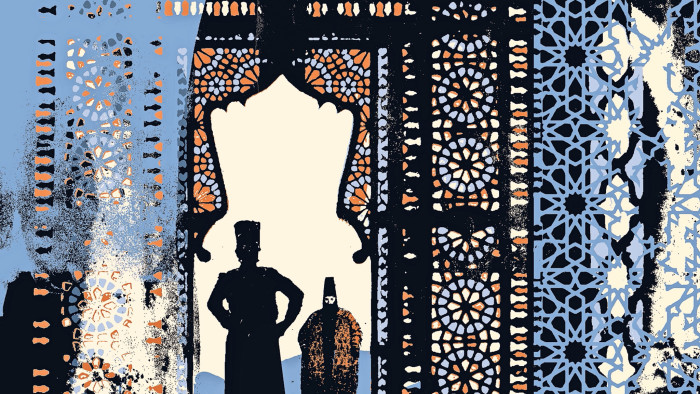‘The King’, by Kader Abdolah

Simply sign up to the Life & Arts myFT Digest -- delivered directly to your inbox.
The King, by Kader Abdolah, Canongate, RRP£14.99, 448 pages
The world is plunging ahead, but we are standing still,” laments the grand vizier in The King, Kader Abdolah’s novel about the 19th-century Persian court. The vizier, Mirza Kabir, is the fictional stand-in for Amir Kabir, a formidable figure in Iranian history and the real hero of this novel, a man of vision who seeks to build modern Persia and is ultimately executed by the Shah for his efforts.
Kabir, we learn, has travelled widely and seen how technical and economic progress has at once strengthened the nations of Europe and lifted up their masses. He wants to build factories, railways and universities, to balance the proud ambitions of Persian hegemony with the practical measures needed to pull ordinary Iranians out of their misery: extending literacy beyond the elite, education for girls, vaccination for smallpox and so on.
But Shah Naser (closely based on the real Shah of the time, Naser al-Din Shah Qajar) brushes aside such plans. Poisoned against the vizier by his controlling mother and preoccupied with his harem, the Shah is chiefly interested in writing poetry and sucking sour cherries directly from the tree without using his hands. When he turns his mind to affairs of state, it is with a preening nationalism that seeks short-term gain; ignoring the vizier, Shah Naser invades Herat, eager to parade about Afghanistan as sovereign, but is pushed back, endangering his country’s ports in the process.
History has not sided with the Qajars, their rule seen as having imperilled Persia through exploitative concessions to the British and other foreign powers. In this, Abdolah (the pen name of a prolific Iranian writer living in the Netherlands) is not entering any real historical fray, but his portrait of Amir Kabir brings the statesman to life. He emerges as the most wise, passionate and humane character of the period, a figure who presciently understands how a weak king makes the country vulnerable to ambitious ayatollahs and foreign machination.
The King spans a transformative era during which Iran was opening up to the world, warding off the competing interests of Britain and Russia as the struggle between tradition and modernity took shape. It could also be read as a fable of contemporary Iran, so chronic are the political ills that it describes – in particular, the disregard shown to the lower classes and the simmering discontent of the educated. For several chapters, it almost seems like a blow-by-blow portrait of how Shah Mohammad Reza Pahlavi’s rule descended into the 1979 revolution.
What is most refreshingly dealt with in this novel is Iran’s suffocating paranoia about British influence. Fiction offers the freedom to consider this national obsession more creatively and Abdolah illustrates how Britain’s envoys manipulated the Persian court, bribing aristocrats to block the vizier’s reforms and working the Great Game to their perpetual advantage.
In one impressive scene, the British delegation arrive at the Shah’s Persian New Year festivities and refuse to take their boots off. The French and the Russians have all padded in but the British ambassador claims to “have strict orders from London” to stay shod. The ayatollah of Tehran is livid and, after the vizier’s offer of royal socks to be worn over the boots is rebuffed, cleric, king and statesman unite in Persian indignation. In Abdolah’s deft handling, such twists reflect how Iranian touchiness about the British is at once a neurosis and a healthy reaction to experience.
After having the vizier killed, Shah Naser travels through Europe and returns a more worldly king, eager to bring advances such as electricity into the palace (the rest of the street, the capital and the nation can wait). But immune to the growing clout of the bazaar and religious reformers, the Shah loses his grip and a non-violent movement to rescind Britain’s tobacco concessions spirals into full-fledged democratic rebellion.
The King probes questions of power and authority through wry fable – Salman Rushdie’s Shame meets Hilary Mantel’s Wolf Hall. Though there are some clichés and infelicities in the English translation, the story is rich with subtle touches: on a rare outing from the palace, the women of the harem pull out binoculars, a gift from the English consul in Tabriz. In the grand tradition of Persian literary satire, the writing is playful, subversive, and compassionate – the king always refers to himself in the third person and converses with his cat, but he can still command our sympathy at times.
Abdolah’s narrator declares at the start that his objective is “rescuing the nation’s lost heritage from oblivion”. One can only hope that this resplendent novel will be published in Iran and read by a nation that has had too little opportunity to reckon with modern history through fiction.
Azadeh Moaveni is author of ‘Lipstick Jihad: A Memoir of Growing Up Iranian in America and American in Iran’ (PublicAffairs)
Comments